8 Of The Unhealthiest Canned Beans You'll Find At The Store
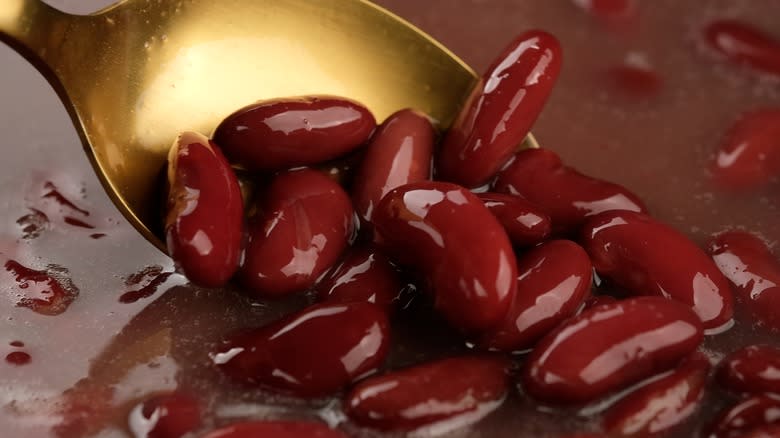
In their most basic form, beans are undeniably healthy. These magic little ingredients are packed with fiber, protein, and important vitamins and minerals, like iron and folate. Because beans can take a while to prepare, though, folks often resort to canned beans to get their legume fix -- and that's where the trouble starts. Even the most basic canned beans can be surprisingly unhealthy and contain additives that you'd rather not be consuming. Salt is one of the main culprits here: Added as a preservative and for flavor, it serves a vital function in keeping your beans tasty and shelf-stable, but it can also spike your sodium intake to worrying levels.
This isn't just a problem with regular canned beans, either. More flavorful canned beans, like refried beans, baked beans, and three-bean salad, can also be packed with ingredients like salt, sugar, high fructose corn syrup, and curious preservatives that have worrying health implications. It's the salt we're really concerned about, though. In this article, we're taking a closer look at the sodium content of various types of canned beans to determine whether they're unhealthy or not. We're also taking into account other nutritional factors like fat, sugar, and additional ingredients.
Read more: The 18 Unhealthiest Store-Bought Sliced Breads You Can Buy
Baked Beans
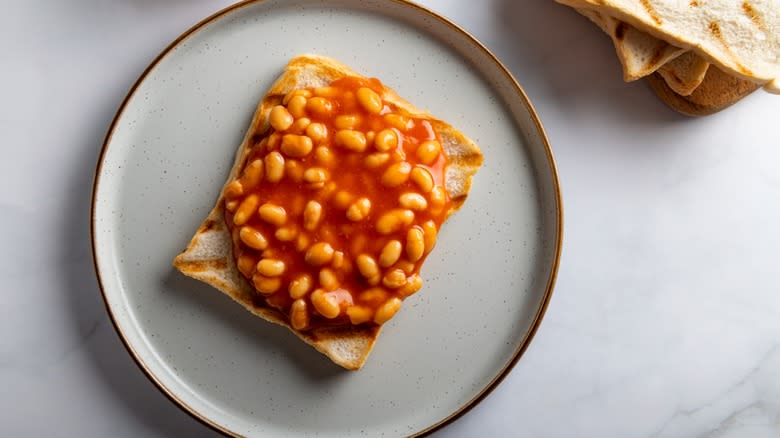
Baked beans may provide you with a simple and tasty breakfast (or lunch, dinner, or snack), but where they get their taste from isn't so appealing. Baked beans typically have a fairly high amount of sodium in each can, with some brands containing over a quarter of your daily value in a small half-cup serving. Certain baked bean flavors, like those that lean into sweeter, smokier notes, can also have a huge amount of added sugar. In just one serving of Great Value Brown Sugar Hickory Baked Beans, for instance, there are 14 grams of added sugar, in addition to 590 milligrams of sodium.
Given that's in a serving size of just 130 grams, it's hardly the most attractive prospect nutritionally -- and these ingredients can impact your body in major ways. Salt and free sugars are two nutrients that you should seek to limit throughout your lifespan, due to their potential impact on your short and long-term health. Consuming too much salt can impact your blood pressure, whereas high sugar levels can damage your dental health and may contribute to obesity and further chronic conditions (per the World Health Organization). Eating foods that are high in both, like baked beans, is hardly the way to go about reducing your intake.
Refried Beans
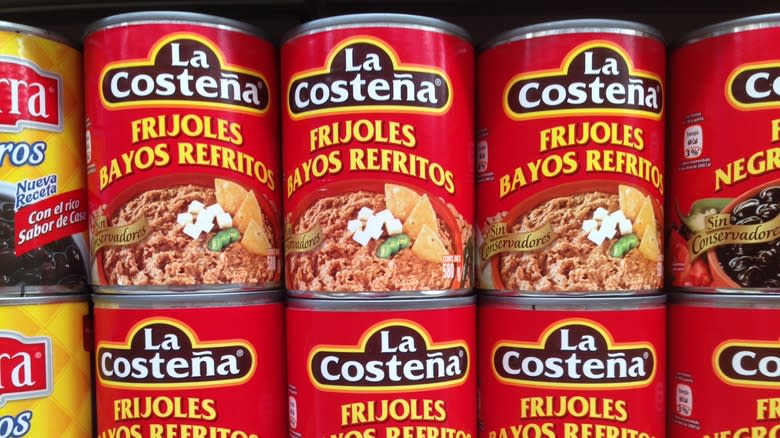
We all love a can of refried beans, but we're pretty sure you're not going to love the nutritional information of this food item. One of the reasons why refried beans are so flavorful is because of their high sodium levels. In a single serving of Rosarita Traditional Refried Beans, there are 580 milligrams of sodium -- a quarter of your daily value. Unlike a lot of other canned beans, refried beans also frequently contain fat, and saturated fat in particular, with around 1 gram per serving. This saturated fat often comes from lard, which incidentally makes these beans unsuitable for vegetarians or vegans.
Unfortunately, many types of canned beans have these sodium levels, making choosing a healthy brand tricky. However, if you look hard enough, they're out there. Try to pick brands that have a lower sodium content per serving, ideally 15% or less of your daily value. Looking for refried beans that don't have high fat content, and particularly high saturated fat content, is also a good idea. If in doubt, you can always make your own refried beans. Doing this will not only make them taste fresher, but allow you to control salt and fat levels.
Green Beans
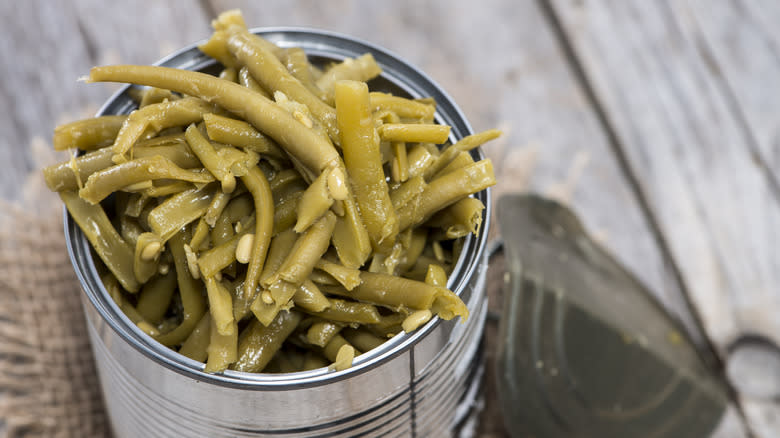
It might be surprising to see green beans on this list, given how healthy they normally are. Green beans are packed with fiber, vitamins, and antioxidants, all while having zero fat content. However, when canned, their nutritional value can plummet fast. Canned green beans are notorious for being high in sodium, with some brands providing 380 milligrams of sodium per serving, approximately 17% of your daily value. Considering this is a vegetable that's often served on the side of a saltier main meal, adding these to your plate can seriously spike your sodium levels.
Unfortunately, high sodium content is all too common in canned foods, even canned vegetables. Salt works to preserve the vegetables once they've been canned, and can make them taste better -- but the unintended effects of consuming this much sodium can be pretty bad. High salt intake has been associated with numerous conditions like high blood pressure, type 2 diabetes, and certain types of cancer. Importantly, though, not all canned green beans are flooded with sodium, and so they're not completely off-limits -- you just need to pick carefully. Go for low-sodium or salt-free canned options, for all of that green bean goodness without any of the health concerns.
Chili Beans
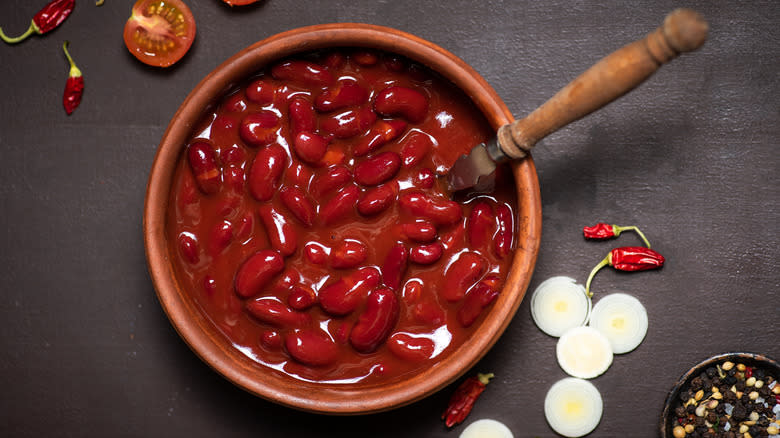
Chili beans are one of those miracle foods that can both give your recipes a flavor boost and be enjoyable on their own. No matter how you're eating them, though, you should be wary of their nutritional profile. Generally speaking, chili beans are high in sodium. The sauce that bathes the beans is flavored with a considerable amount of salt, and each serving delivers around 530 milligrams of sodium -- almost a quarter of your daily value.
It's a shame, because other than their sodium content, these beans look pretty good: They're low in fat, have no added sugar, and have considerable fiber and protein content. The salt, however, puts them firmly in the unhealthy category. The vast majority of salt in our diets is added to food, and this quantity has increased considerably in the last few decades, both in the United States and around the world. Unfortunately, this has also raised the frequency of the development of chronic diseases as a consequence of salt consumption. No matter how you spin it, eating too much will have an impact on your health, as a study published in Pediatric Nephrology discusses.
Seasoned Black-Eyed Peas
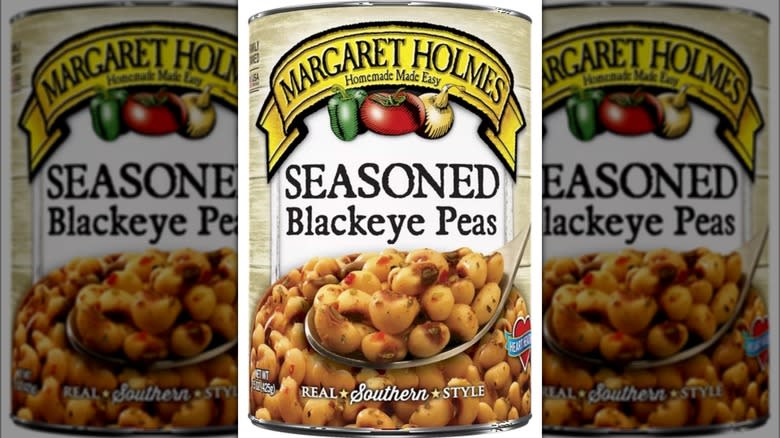
Black-eyed peas are a common side dish, but without seasonings, they're pretty boring. A host of food producers have attempted to address this problem, offering pre-canned seasoned black-eyed peas that require little more than pouring them out of the can, heating them up, and serving. But these same food manufacturers also have a tendency to cram a wild amount of salt into every product and include additional additives, like disodium EDTA.
Margaret Holmes Canned Seasoned Blackeye Peas is one such product. Containing 570 milligrams of sodium per serving, each half-cup covers a quarter of your daily sodium value. Its disodium EDTA content is "to promote color retention," but its mere presence rings alarm bells. This common additive is widely seen in industrial, cosmetic, and food products, and acts as a preservative. However, it has been noted to affect bowel function; one study published in Scientific Reports found that disodium EDTA can exacerbate inflammation and aggravate colitis. This 2021 study was conducted on mice, and it should be noted that consuming large enough quantities of disodium EDTA to bring about the effect in humans is pretty difficult. Still, it's worth paying attention to -- especially since many canned beans don't contain this additive, which makes one wonder why it's here at all.
Ranch-Style Beans
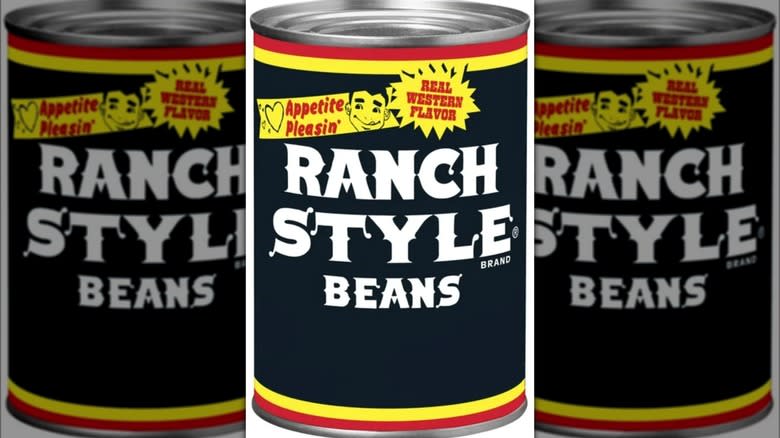
Few dishes are as homey as ranch-style beans. This Texan classic has a spicy, complex flavor, with tender beans that you just can't resist spooning into your mouth. Homemade ranch-style beans can take a few hours to make, though, and it's infinitely easier to grab a can and open it -- if you're willing to put up with the nutritional content, that is.
Canned ranch-style beans are, like other canned beans, high in sodium. A serving of ranch-style beans will generally provide around 450 milligrams of sodium, roughly a fifth of the daily value of 2,300 milligrams set out by the FDA. These beans also have a small amount of fat and added sugar, and while they're present in fairly low quantities (4 grams and 1 gram, respectively), they're still worth mentioning. It's the salt that's the biggest issue, though. Arguably the biggest bodily system salt affects is your cardiovascular system, and wide-reaching research in The BMJ has pointed out the link between sodium consumption and higher rates of cardiovascular disease and stroke. While homemade ranch-style beans may take longer, they're worth it for the ability to limit how much salt you put into them.
Three Bean Salad
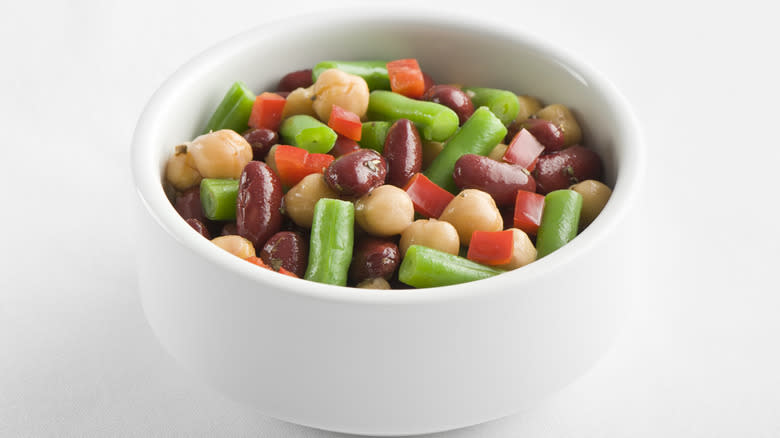
Call us old-fashioned, but we believe that salads should be healthy -- or at least, not actively unhealthy. Normally, three bean salad definitely falls on the healthy end of the spectrum, with the combination of beans giving you a wide variety of vitamins and minerals, and boosting your fiber and protein intake. Canned three bean salad is another story, though. Food producers see fit to add loads of extra ingredients to try and boost flavor.
Take Read's Classic Three Bean Salad, for instance. A half-cup of this canned salad delivers 300 milligrams of sodium, which doesn't seem too bad. But then there's its added sugar content -- a whopping 9 grams per half-cup. Both of these ingredients are clearly added for flavor, as well as for their preserving capabilities. However, the idea that they need these ingredients, particularly in the case of sodium, is a big canned food myth. Canned foods don't need any salt in them, or indeed any sugar, to maintain a longer lifespan, as the canning process kills off any harmful microbes. That's why we would recommend picking up a few cans of your favorite low-sodium beans and throwing together your own three bean salad. It'll take barely any time, and will likely taste better.
Full-Sodium Canned Beans
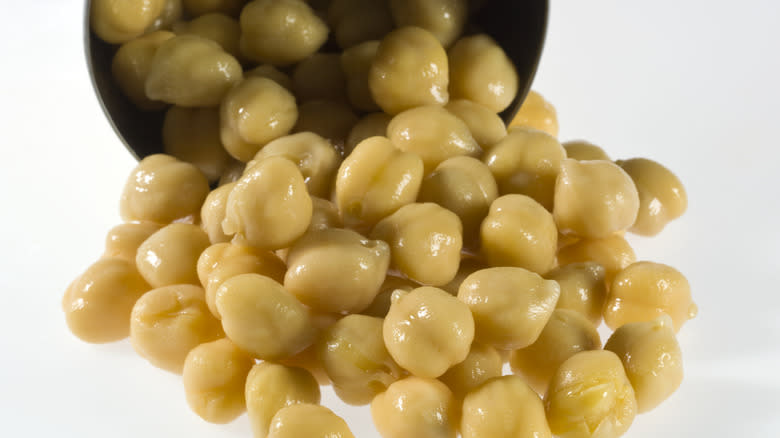
We hate to say it, but one of the unhealthiest types of canned beans is the most unassuming: plain, undressed beans. One of the biggest false facts about canned beans is that unadorned versions are always healthy -- virtually every type of canned bean, from red kidney beans to chickpeas to black beans comes in sodium-rich form. Sometimes, these sodium levels can almost match flavored bean varieties. A half-cup of Bush's Canned Garbanzo Beans, for example, contains 480 milligrams, which is just slightly less than the amount in the same serving size of chili beans, and more than you'll find in canned ranch-style beans.
Luckily, there are loads of low-sodium and salt-free options out there, which allow you to have your bean fix without consuming any unnecessary salt. You should always look out for those in store, and pick them over full-sodium varieties. If you do happen to pick up a salty can of beans by mistake, you can always run them under the tap. Rinsing your beans can remove any excess salt content, significantly lowering the amount that ends up in your food. There's another practical reason you should rinse canned beans, though. Doing so gets rid of all of that gummy starch that ends up on your beans after they've soaked for a while in the can, giving the beans a cleaner taste and presence in your meal.
Read the original article on Daily Meal

